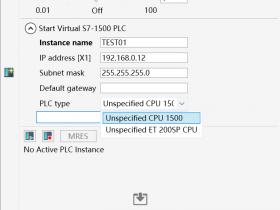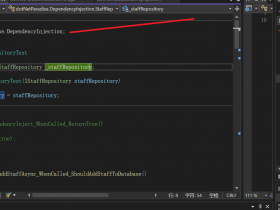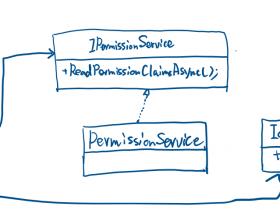- A+
所属分类:.NET技术
NLog is a flexible and free logging platform for various .NET platforms, including .NET standard. NLog makes it easy to write to several targets. (database, file, console) and change the logging configuration on-the-fly.
最佳实践
控制台项目
在项目中添加组件包
Install-Package Microsoft.Extensions.Configuration.Json Install-Package NLog Install-Package NLog.Extensions.Logging { "Logging": { "LogLevel": { "Default": "Information", "Microsoft": "Warning", "Microsoft.Hosting.Lifetime": "Information" } }, "AllowedHosts": "*" } <?xml version="1.0" encoding="utf-8" ?> <nlog xmlns="http://www.nlog-project.org/schemas/NLog.xsd" xmlns:xsi="http://www.w3.org/2001/XMLSchema-instance" autoReload="true" internalLogLevel="Warn" internalLogFile="internal-nlog.txt"> <!-- define various log targets --> <targets> <!-- write logs to file --> <target xsi:type="File" name="allfile" fileName="nlog-all-${shortdate}.log" layout="${longdate}|${logger}|${uppercase:${level}}|${message} ${exception}" /> <target xsi:type="File" name="ownFile-web" fileName="nlog-own-${shortdate}.log" layout="${longdate}|${logger}|${uppercase:${level}}| ${message} ${exception}" /> <target xsi:type="Null" name="blackhole" /> </targets> <rules> <!--All logs, including from Microsoft--> <logger name="*" minlevel="Trace" writeTo="allfile" /> <!--Skip Microsoft logs and so log only own logs--> <logger name="Microsoft.*" minlevel="Trace" writeTo="blackhole" final="true" /> <logger name="*" minlevel="Trace" writeTo="ownFile-web" /> </rules> </nlog> 添加一个类Runner.cs。
using Microsoft.Extensions.Logging; namespace ConsoleDemo { public class Runner { private readonly ILogger<Runner> _logger; public Runner(ILogger<Runner> logger) { _logger = logger; } public void DoAction(string name) { _logger.LogDebug(20, "Doing hard work! {Action}", name); } } } 通过注入的方式调用。
using Microsoft.Extensions.Configuration; using Microsoft.Extensions.DependencyInjection; using Microsoft.Extensions.Logging; using NLog; using NLog.Extensions.Logging; using System; namespace ConsoleDemo { class Program { static void Main(string[] args) { var logger = LogManager.GetCurrentClassLogger(); try { var config = new ConfigurationBuilder().SetBasePath(System.IO.Directory.GetCurrentDirectory()) .AddJsonFile("appsettings.json", optional: true, reloadOnChange: true) .Build(); var servicesProvider = BuildDi(config); using (servicesProvider as IDisposable) { var runner = servicesProvider.GetRequiredService<Runner>(); runner.DoAction("Action1"); Console.WriteLine("Press ANY key to exit"); Console.ReadKey(); } } catch (Exception ex) { // NLog: catch any exception and log it. logger.Error(ex, "Stopped program because of exception"); throw; } finally { LogManager.Shutdown(); } } private static IServiceProvider BuildDi(IConfiguration config) { return new ServiceCollection() .AddTransient<Runner>() // Runner is the custom class .AddLogging(loggingBuilder => { // configure Logging with NLog loggingBuilder.ClearProviders(); loggingBuilder.SetMinimumLevel(Microsoft.Extensions.Logging.LogLevel.Trace); loggingBuilder.AddNLog(config); }) .BuildServiceProvider(); } } } 运行项目,项目根目录下会多出两个日志文件。

AspNetCore项目
在项目中添加组件包
Install-Package NLog Install-Package NLog.Web.AspNetCore { "Logging": { "LogLevel": { "Default": "Trace", "Microsoft": "Warning", "Microsoft.Hosting.Lifetime": "Information" } }, "AllowedHosts": "*" } <?xml version="1.0" encoding="utf-8" ?> <nlog xmlns="http://www.nlog-project.org/schemas/NLog.xsd" xmlns:xsi="http://www.w3.org/2001/XMLSchema-instance" autoReload="true" internalLogLevel="Warn" internalLogFile="internal-nlog.txt"> <!-- define various log targets --> <targets> <!-- write logs to file --> <target xsi:type="File" name="allfile" fileName="nlog-all-${shortdate}.log" layout="${longdate}|${logger}|${uppercase:${level}}|${message} ${exception}" /> <target xsi:type="File" name="ownFile-web" fileName="nlog-own-${shortdate}.log" layout="${longdate}|${logger}|${uppercase:${level}}| ${message} ${exception}" /> <target xsi:type="Null" name="blackhole" /> </targets> <rules> <!--All logs, including from Microsoft--> <logger name="*" minlevel="Trace" writeTo="allfile" /> <!--Skip Microsoft logs and so log only own logs--> <logger name="Microsoft.*" minlevel="Trace" writeTo="blackhole" final="true" /> <logger name="*" minlevel="Trace" writeTo="ownFile-web" /> </rules> </nlog> 在Program.cs中使用NLog。
using Microsoft.AspNetCore.Hosting; using Microsoft.Extensions.Hosting; using Microsoft.Extensions.Logging; using NLog.Web; using System; namespace WebDemo { public class Program { public static void Main(string[] args) { var logger = NLog.Web.NLogBuilder.ConfigureNLog("nlog.config").GetCurrentClassLogger(); try { logger.Debug("init main"); CreateHostBuilder(args).Build().Run(); } catch (Exception exception) { //NLog: catch setup errors logger.Error(exception, "Stopped program because of exception"); throw; } finally { // Ensure to flush and stop internal timers/threads before application-exit (Avoid segmentation fault on Linux) NLog.LogManager.Shutdown(); } } public static IHostBuilder CreateHostBuilder(string[] args) => Host.CreateDefaultBuilder(args) .ConfigureWebHostDefaults(webBuilder => { webBuilder.UseStartup<Startup>(); }) .ConfigureLogging(logging => { logging.ClearProviders(); logging.SetMinimumLevel(LogLevel.Trace); }).UseNLog(); // NLog: Setup NLog for Dependency injection } } 一切准备就绪,在任意地方写日志。
using Microsoft.AspNetCore.Mvc; using Microsoft.Extensions.Logging; using System; using System.Collections.Generic; using System.Linq; namespace WebDemo.Controllers { [ApiController] [Route("[controller]")] public class WeatherForecastController : ControllerBase { private static readonly string[] Summaries = new[] { "Freezing", "Bracing", "Chilly", "Cool", "Mild", "Warm", "Balmy", "Hot", "Sweltering", "Scorching" }; private readonly ILogger<WeatherForecastController> _logger; public WeatherForecastController(ILogger<WeatherForecastController> logger) { _logger = logger; } [HttpGet] public IEnumerable<WeatherForecast> Get() { _logger.LogInformation("Hello, this is a Weather api!"); var rng = new Random(); return Enumerable.Range(1, 5).Select(index => new WeatherForecast { Date = DateTime.Now.AddDays(index), TemperatureC = rng.Next(-20, 55), Summary = Summaries[rng.Next(Summaries.Length)] }).ToArray(); } } } 调用上面api,查看日志文件。

更多用法,请查看官方wiki文档:https://github.com/NLog/NLog/wiki




